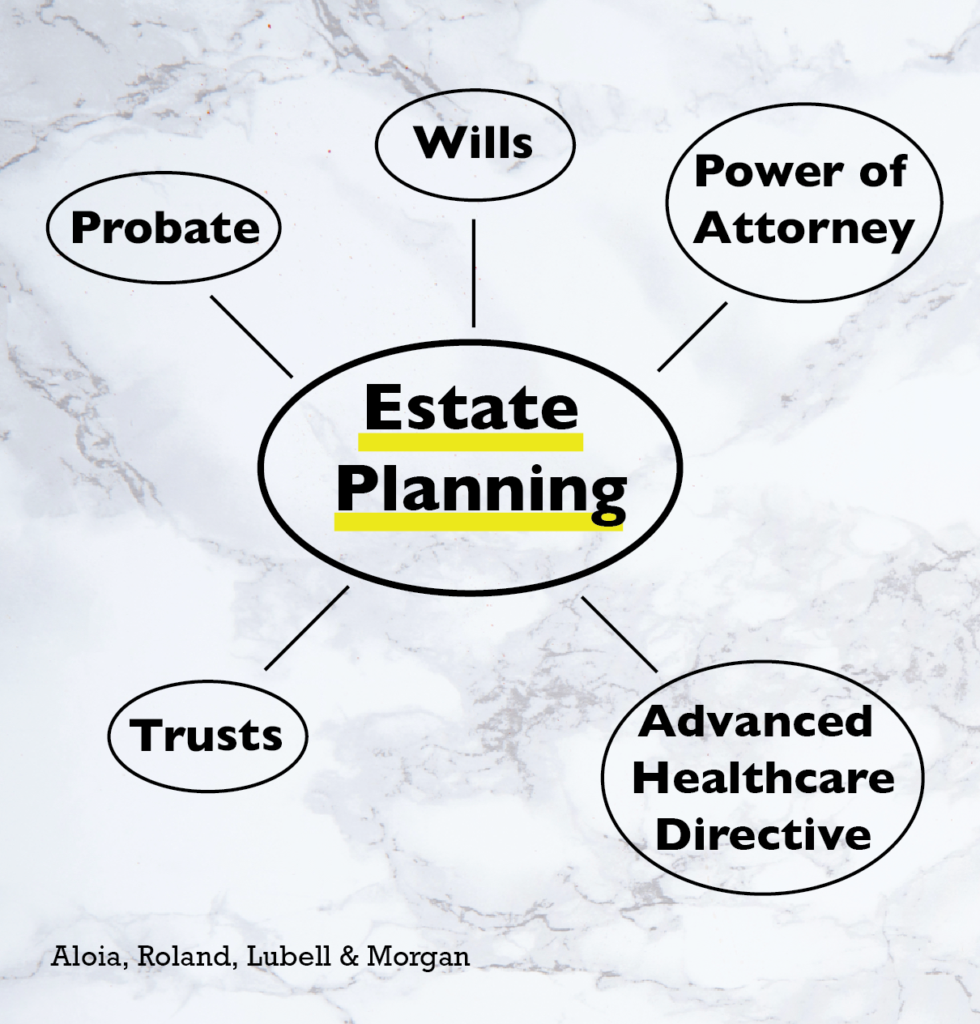Many of us have heard the term “estate planning,” or at least such terms as “last will and testament,” “reading of the will,” or some such. Perhaps you’ve been advised that you need a Will or a Trust. But what is estate planning, and how do we do it?
“Estate Planning” means anticipating that one day our health will fail, and planning accordingly. Traditionally, estate planning simply meant acknowledging that eventually we will die, and planning for the distribution of our assets, as well as care for our dependents. Today, it includes the possibility that we may become incapacitated, and ensuring that we will receive adequate care when the time comes. To create an estate plan, you need to consider what you want to have happened if you become incapacitated, and when you pass away, and to document your wishes.

As stated, traditionally estate planning was only concerned with what would happen after you pass away, but today we are also concerned about what will happen if you become incapacitated. Documents can either address your property, or your health, and the documents are either relevant when you become incapacitated or when you pass away.
Using a Power of Attorney, a Principal appoints an Agent who can act on the principal’s behalf with regards to property and contracts. Your Agent has the same authority as you would have yourself. For example, you may want your Agent to pay your bills on your behalf, to be able to manage your property, or maybe file taxes on your behalf.
- General Power of Attorney — This grants your Agent a wide range of powers, to act on your behalf in almost any situation and regarding virtually any assets or transactions. A General Power of Attorney lasts until it is revoked, until the principal becomes incapacitated, or until the principal passes away.
- Limited Power of Attorney — As the name implies, a Limited Power of Attorney grants limited powers. For example, the Agent may only be authorized to sell the Principal’s home, or the Agent may only be authorized to make certain purchases. Typically, a Limited Power of Attorney will terminate when the purpose is accomplished, or the document may specify an end date.
- Durable Power of Attorney — This type of Power of Attorney stays in effect until the Principal passes away. If you grant someone a Durable Power of Attorney, he or she will retain the power to act on your behalf after you become incapacitated, and allow you to nominate the person(s) who will manage your financial affairs when you are no longer able to.
- BONUS: Springing Power of Attorney — A Springing Power of Attorney is not valid in Florida if it is executed on or after October 1, 2011. A Springing Power of Attorney is a Power of Attorney that only becomes effective upon a certain event happening. As an example, a Springing Power of Attorney might only go into effect once the Principal becomes incapacitated. This leads to the following question: When does any other type of Power of Attorney go into effect? Immediately. In Florida, a Power of Attorney (other than a springing power of attorney) goes into effect the moment the document is executed. This means that the document is signed by the Principal and by two witnesses before a Notary Public. Considering that your Agent can spend your money as if it’s theirs, and can tie you up in contracts as if he/she is you, it is important to only appoint someone you trust as your Agent.

There are up to four different documents that are related to your healthcare. Some legal practitioners provide separate documents for each, and it is not uncommon for particular entities, such as a hospital, to provide one or more of these documents. Alternatively, many legal practitioners combine one or more of these documents together. It is particularly common for the other medical documents to include a HIPAA authorization.
- Designation of Healthcare Surrogate — While you’re capable of making your own healthcare decisions, of course, you make your own healthcare decisions. But what if you become incapacitated and cannot make your own decisions anymore? Your Healthcare Surrogate is then authorized to make those decisions for you. That means that any time a doctor needs your consent to perform a medical procedure, your agent may provide or refuse consent on your behalf. While generally, the goal is to provide your agent with the broadest decision-making powers, you may want to include your general wishes in the document.
- Living Will — This document describes your end-of-life wishes and authorizes an agent to ensure that your wishes are followed. For example, you may not want to be kept alive through artificial means, or you might believe that if you are unable to feed yourself then nutrition and hydration should be kept from you so that you may die naturally. It is imperative that you discuss your wishes with your agent under a Living Will so that he or she will know when you would want to be kept alive, and when you would want to pass on.
- Declaration of Pre-Need Guardian — A guardian is an individual who has been appointed by the court to exercise your legal rights. In the event that you may need a Guardian, this document nominates the person you would want the court to appoint. This person may legally make decisions to provide for your medical, mental, and personal care, and may determine the residential setting best suited for your needs.
- HIPAA Authorization — The federal Health Insurance Portability and Accountability Act created strict privacy rules regarding your medical information. While the scope is much broader, it can simply be stated that medical professionals may not share your private information without your express permission. A HIPAA authorization allows your medical providers to provide some or all of your medical information to certain people, as specified in the authorization. As an easy example, without receiving your private medical information, your healthcare surrogate may be authorized to provide consent on your behalf, but may not have the information necessary to make an informed decision.
Many legal practitioners will provide your Agent with the broadest possible powers, and leave it up to you to discuss with your agent what your wishes are, while other legal practitioners may provide a lot of options for you to give very precise instructions. In particular, healthcare documents prepared by medical providers tend to be far more specific and include far more eventualities than documents prepared by legal professionals.
The most recent ‘basic’ estate planning document is also the most descriptive. You appoint a person to take care of your funeral and memorial arrangements and provide as much, or as little, instructions as you feel appropriate. Some people merely choose an agent and let him or her decide, whereas other people may provide pages of instructions, including, but not limited to, pre-funerary rites (such as a Wake), the name and address for funeral services, preferred ministers, specific quotes from scriptures, open or closed casket, name and address of the mortuary, location of internment, selection of music, and anything else deemed appropriate. There’s no wrong way to do it, and every person can decide for themselves how much, or how little, detail to provide.
After you pass away, your assets will need to be distributed to one or more persons who are still living. While you are alive, you can write a check to give away money, sign a deed to give away land, etc., but when you’re gone, you can’t do that anymore. There is a legal process, called Probate, which is a court-supervised procedure for transferring assets from someone who is gone to someone who is still alive. If you fail to plan, the court will distribute your assets according to state law, which may or may not result in your assets going to the persons you wish to receive them. To ensure your assets go to the people you want, you can prepare a Will, which is a letter to the probate court explaining who should receive your assets after you’re gone.
There are more options available than just preparing a Will, and these are sometimes referred to as Will-Substitutes. Alternative ways of planning could include certain types of deeds, such as a Life Estate or an Enhanced Life Estate, joint ownership with rights of survivorship, beneficiary designations on financial accounts, and Trusts. The advantages and disadvantages of having a Will or using an alternative option will be discussed in a different article.

If you have any minor children or other dependents, your estate plan should include arrangements for them as well. For your children, you will want to arrange for their financial and social well-being. Depending on your economic situation, you may want to buy life insurance, to ensure they can grow up in the lifestyle you would want for them. You will also want to prepare a Declaration of Pre-Need Guardian for Minors, to nominate who you believe would be best-positioned to take care of your children if you’re no longer around.
A Court will need to hold a hearing to determine what’s in the best interest of your children but generally will defer to your choice of guardian. Depending on circumstances, such as if your preferred guardian lives out of state, you may also want to nominate a temporary guardian – someone local, who can pick up your children after school and care for them until your permanent guardian arrives.
This article was prepared by Stefan Dunkelgrun, Aloia Roland’s Wills, Trusts and Estates attorney.
Aloia, Roland, Lubell & Morgan, PLLC is a full-service law firm with practice areas in business and real estate law, commercial litigation, personal injury and wrongful death, class action litigation, family law and wills, trusts, estates and probate. Established in 2004 and led by senior partners, Frank Aloia, Jr., Ty Roland, Evan Lubell, Jack Morgan III, and partner, Danielle Levy Seitz, the firm has deep roots in Southwest Florida, proudly serving its community. Aloia Roland is Headquartered at 2222 Second Street in downtown Fort Myers, Florida. Learn more at www.LawDefined.com or call (239) 791-7950.

